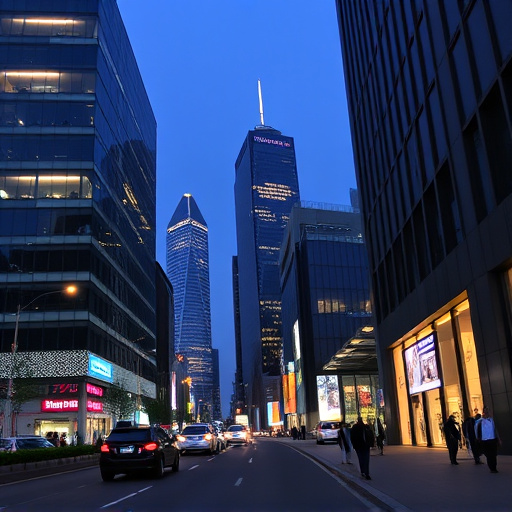In Karachi, Islamic banking has gained prominence as an alternative financial system based on Shariah law, offering products like Murabaha, Ijara, and Zakat. The city's status as a bustling metropolis attracts numerous Islamic banks catering to diverse customers. Its inclusive services, transparency, and social responsibility appeal to those seeking Shariah-compliant options. The contrast with conventional banking, which relies on interest charges, drives the growth of Islamic banking globally. Karachi's financial scene showcases both systems, with Islamic banks adhering to Shariah principles and conventional banks offering non-Islamic contracts. This dual presence caters to diverse needs while fostering a culturally rich environment. Islamic banking in Karachi is evolving through education and positive perceptions, promising a future of enhanced inclusivity and technological advancements.
In the dynamic financial landscape of Karachi, the contrast between Islamic banking and conventional practices is a topic of growing interest. This article explores these two distinct approaches to finance, delving into their principles, services, and impacts on the city’s economy. We examine how Islamic banking, guided by Shariah law, differs from interest-based lending, its regulatory framework, and customer experiences. By analyzing key differences and future trends, we uncover the evolving banking landscape in Karachi, offering insights for both financial enthusiasts and residents.
- Understanding Islamic Banking: Principles and Practices in Karachi
- The Conventional Banking System: How It Works and Its Limitations
- Key Differences: Shariah Compliance vs. Interest-Based Lending
- Financial Services Offered: Islamic Banks vs. Conventional Institutions
- Impact on the Economy: Growth and Stability in Karachi's Financial Sector
- Customer Perspective: Experience and Perception of Islamic Banking
- Regulatory Framework: Governance and Oversight in Karachi's Banking Industry
- Future Trends: The Evolving Landscape of Banking in Karachi
Understanding Islamic Banking: Principles and Practices in Karachi

In Karachi, Islamic banking has emerged as a significant and rapidly growing sector, offering an alternative financial system that aligns with Islamic principles. This form of banking is based on Shariah law, which prohibits interest (riba) and encourages ethical practices in financial transactions. The industry operates through various products and services, such as Murabaha (cost-plus financing), Ijara (leasing), and Zakat (charitable giving), ensuring that all activities remain within the framework of Islam’s teachings.
Karachi, being a bustling metropolis and a major financial hub in Pakistan, has witnessed the establishment of numerous Islamic banks and financial institutions. These entities cater to a diverse range of customers, from individuals seeking Shariah-compliant savings accounts to businesses requiring financing for projects that adhere to Islamic values. The popularity of Islamic banking in Karachi can be attributed to its ability to provide inclusive financial services while promoting transparency and social responsibility among its clientele.
The Conventional Banking System: How It Works and Its Limitations

The conventional banking system, prevalent in many parts of the world, including Karachi, operates on a principle of charging interest on loans and investments. Customers deposit their money into accounts, which banks then use to offer loans at a profit margin, known as interest rates. This model is based on the concept of creating monetary value through the allocation and management of funds. While it has been successful in facilitating economic growth, there are limitations and criticisms associated with this system.
One significant challenge is the issue of usury, where charging excessive interest rates can lead to financial strain for borrowers. Additionally, conventional banks do not cater to individuals or businesses adhering to Islamic principles that forbid interest-based transactions. This has sparked the development of Islamic banking, offering alternative financial services in line with Sharia law, addressing the limitations and seeking a more inclusive and ethical approach to finance.
Key Differences: Shariah Compliance vs. Interest-Based Lending

In the vibrant financial landscape of Karachi, as in many cities globally, a significant divide exists between Islamic banking and conventional banking practices. At the heart of this distinction lies the fundamental difference in their underlying principles: Shariah compliance versus interest-based lending.
Islamic banking operates under a strict adherence to Shariah law, which prohibits the charging or paying of interest (riba). Instead, it focuses on profit-sharing and risk-bearing arrangements, such as mudarabah and musyarakah. In contrast, conventional banking systems are built upon the concept of interest, where loans are charged with predetermined interest rates, offering a clearer yet potentially more lucrative structure for lenders but one that is at odds with Islamic legal frameworks. This key difference not only shapes the products and services offered by these banks but also influences their operations, investment strategies, and customer base in the bustling metropolis of Karachi.
Financial Services Offered: Islamic Banks vs. Conventional Institutions

In Karachi, as in many cities around the world, both Islamic banks and conventional institutions offer a range of financial services to cater to diverse customer needs. Islamic banking operates on principles derived from Shariah law, providing solutions that are compliant with Islamic teachings. These include various types of accounts, such as savings and current accounts, along with investment products like mutual funds and bonds that adhere to ethical standards. Islamic banks also offer financing options like Murabaha (cost-plus financing) and Ijarah (leasing), which are structured to be Shariah-compliant.
In contrast, conventional banking in Karachi provides a more traditional array of financial services, including standard deposits, loans, credit cards, and investment products not specifically tailored to Islamic laws. These institutions cater primarily to those who prefer non-Islamically structured financial contracts. While they may offer some ethical investment options, their core products do not align with the principles of Islamic finance. The presence of both types of banks in Karachi reflects the city’s diversity and the growing importance of inclusive financial services that meet the needs of a broad spectrum of residents, including those who follow Islamic guidelines in their financial dealings.
Impact on the Economy: Growth and Stability in Karachi's Financial Sector

Customer Perspective: Experience and Perception of Islamic Banking

In Karachi, as in many cities around the world, the rise of Islamic banking has been met with a mix of curiosity and skepticism from customers. Those who have experienced Islamic banking often praise its ethical foundations, which forbid charging interest (riba) and focus on wealth sharing and social responsibility. This alternative approach appeals to customers seeking more transparent and socially conscious financial services, particularly in light of the global financial crises that have underscored the risks of conventional banking practices.
However, perceptions remain varied. Some customers, accustomed to the familiarity of conventional banking, find Islamic banking’s concepts and products less intuitive. Terms like murabaha (cost-plus financing) or Ijarah (leasing) can be foreign, leading to initial confusion. Yet, proactive educational efforts by Islamic banks in Karachi have helped bridge this gap, with many now offering clear explanations and accessible tools to help customers navigate these differences. Over time, as more people engage with Islamic banking and witness its benefits, such as competitive rates for those who meet the qualifications, perceptions are shifting positively.
Regulatory Framework: Governance and Oversight in Karachi's Banking Industry

In Karachi, the banking industry operates within a robust regulatory framework designed to ensure stability and fairness in financial transactions. The State Bank of Pakistan (SBP), the central bank, plays a pivotal role in overseeing and regulating both conventional and Islamic banking institutions. The SBP has implemented comprehensive guidelines and regulations that cater specifically to Islamic banking practices, ensuring compliance with Sharia principles. This oversight includes strict adherence to risk management, transparency, and ethical financial practices, which are foundational to Islamic banking’s unique approach.
Karachi, as Pakistan’s economic hub, boasts a diverse range of banks, including those adhering strictly to Islamic banking principles. The regulatory framework in place not only safeguards the interests of depositors but also fosters trust and encourages growth in this segment of the financial sector. This environment of stringent governance contributes to Karachi’s reputation as a center for innovative and responsible banking practices, where Islamic banking has found a solid footing alongside conventional models.
Future Trends: The Evolving Landscape of Banking in Karachi

In the dynamic city of Karachi, the banking sector is witnessing a significant evolution, driven by the integration of Islamic and conventional banking practices. As the financial hub of Pakistan, Karachi’s banking landscape is not only adapting to global trends but also exploring innovative models that cater to a diverse customer base. The future of banking in this metropolitan area promises to be characterized by enhanced inclusivity, technological advancement, and a fusion of traditional values with modern financial services.
With a growing population and a thriving economy, Karachi’s banks are focusing on expanding their Islamic banking offerings, which have gained popularity for their adherence to Shariah principles. This trend is expected to continue, leading to the development of specialized financial products and services tailored to Muslim communities. Simultaneously, conventional banking institutions in Karachi are embracing digital transformation, implementing cutting-edge technologies to improve customer experience and security. The evolving banking landscape in Karachi thus reflects a harmonious blend of cultural sensitivity, technological innovation, and a commitment to providing accessible, ethical financial solutions.
In the vibrant financial landscape of Karachi, the co-existence of Islamic banking and conventional banking presents a unique dichotomy. This article has explored the nuances of both systems, highlighting key differences in principles, practices, and offered services. By examining the impact on the local economy and customer experiences, it’s evident that Islamic banking is not just a niche alternative but a significant contributor to Karachi’s financial stability and growth. As regulatory frameworks continue to evolve, the future of banking in this metropolis looks promising, with both systems fostering inclusivity, transparency, and innovative financial services for a diverse range of customers.





Leave a Reply
You must be logged in to post a comment.